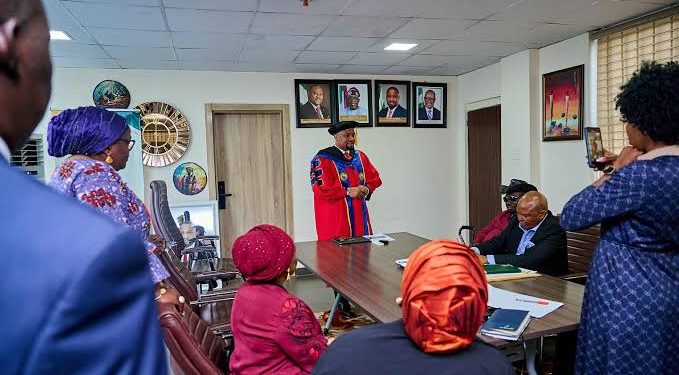The Small and Medium Enterprises Development Agency of Nigeria (SMEDAN) recently hosted Dr. Silvia Morgenroth and her team from the German Federal Ministry for Economic Cooperation and Development (BMZ) in a strategic meeting aimed at deepening bilateral collaboration on enterprise development.
Held at SMEDAN’s headquarters, the visit provided a platform for robust discussions around shared goals in supporting small and medium-sized enterprises (SMEs) , a vital segment of Nigeria’s economy. With SMEs contributing significantly to employment, innovation, and income generation, both parties recognised the need for targeted interventions to drive inclusive and sustainable economic growth.
The engagement explored several key areas of cooperation, including technical and vocational education, access to finance, digital transformation, and enterprise formalisation. Discussions also focused on fostering knowledge exchange and creating scalable capacity-building programmes that can equip Nigerian entrepreneurs with the tools to navigate evolving markets and global value chains.
Dr. Morgenroth reaffirmed BMZ’s interest in building partnerships that deliver measurable social and economic outcomes, especially in emerging economies like Nigeria. She noted that Germany sees value in investing in ecosystems that strengthen local entrepreneurship, reduce poverty, and promote economic resilience.
In response, SMEDAN’s leadership welcomed the proposed collaboration and highlighted existing initiatives that could benefit from technical support and international best practices. These include youth and women-focused enterprise programmes, innovation-driven hubs, rural enterprise support, and value-chain development in agriculture and manufacturing.
SMEDAN emphasized that building bridges with international agencies like BMZ aligns with its broader mission of creating enabling environments for Nigerian SMEs to thrive both locally and globally. The agency also noted that this partnership could accelerate progress on key national development priorities, including job creation, poverty reduction, and improved export readiness.
As part of the visit, both parties expressed interest in developing a joint framework for future cooperation, potentially involving German development agencies, private sector stakeholders, and Nigerian institutional partners. The framework would identify priority areas, pilot projects, and implementation timelines to ensure practical outcomes.
This visit, which represents a step forward in Nigeria-Germany economic relations, signals a renewed focus on partnerships that are not only diplomatic but also action-oriented—designed to create real impact for everyday entrepreneurs operating in Nigeria’s dynamic but challenging business landscape.
SMEDAN reaffirmed its openness to continuous engagement and underscored that supporting Nigerian SMEs through global alliances remains central to its strategy for inclusive economic development.










